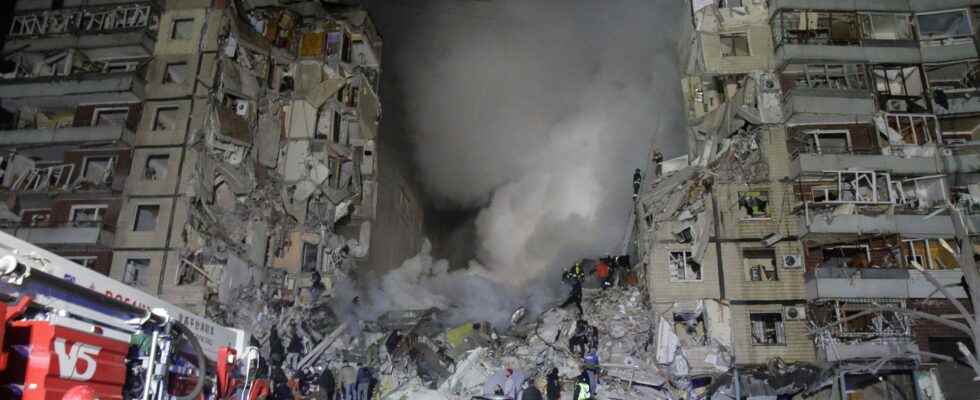Rescuers are still working to find survivors in the ruins of a residential area in Dnipro, eastern Ukraine, hit on Saturday January 14 by a Russian strike. Terrifying images of firefighters attempting to extract bodies from several stories of smoke and debris have circulated. The latest toll reports at least 36 dead and 75 injured, but dozens of people remain missing.
The United States denounced “a new example of the brutal and barbaric war waged by Russia against the Ukrainian people”. A spokesperson for the National Security Council assured that they “will continue to provide Ukraine with what it needs to defend itself”. For its part, the Kremlin denied, Monday, January 16, any strike by Russian forces on this apartment building.
On the night of Sunday to Monday January 16, Russia also reportedly launched a rocket attack against the city of Zaporizhzhia in southeastern Ukraine. This attack would also have injured civilians and destroyed residential infrastructure, according to the head of the administration Oleksandr Starukh who posted on Telegram in the night.
NATO will send more heavy weapons
In response to these new deadly attacks against civilians, NATO announced on Sunday that Ukraine could expect more aid from the West in terms of heavy weapons. “Recent heavy armament pledges are significant – and I expect there will be more in the near future,” NATO Secretary General Jens Stoltenberg said. This implication takes place a few days before a new coordination meeting, in Germany on January 20, of Western countries providing aid to Ukraine.
Western nations have long been reluctant to deliver heavier weaponry to kyiv, fearing they will be drawn into the war. But at the beginning of January, France, Germany and the United States finally promised to send armored infantry or reconnaissance tanks – 40 German Marders, 50 American Bradleys and French AMX-10 RCs. The United Kingdom also announced on Saturday January 14 that it would deliver 14 Challenger 2 tanks to Ukraine “in the coming weeks”. It is the first country to supply heavy tanks of western construction to kyiv. Poland said it was ready on Wednesday to deliver 14 German Leopard 2 heavy tanks, which requires Berlin’s approval. For its part, kyiv had already received from its allies heavy tanks of Soviet design – nearly 300 – but still none of Western manufacture.
Russia reacted on Monday, January 16, by saying that it promised to “burn” the Western tanks delivered to Ukraine.
A “huge” electricity production deficit
During the day on Sunday, Russian strikes also continued to rain down on Kherson, affecting infrastructure and the premises of the Red Cross. Rocket offensives were also underway “near Bakhmout and Avdiivka”, according to the Ukrainian General Staff. Power cuts again affect most parts of the country after these new attacks.
“The production deficit in the electricity system after the attack is enormous. Several thermal power plants are no longer working,” the CEO of the energy company YASNO, Serguiï Kovalenko, indicated on Facebook, announcing consequent restrictions on the supply of electricity in the whole country, especially in kyiv. This week, the head of the International Atomic Energy Agency (IAEA) Raphael Grossi will also visit Ukraine to deploy inspectors to several nuclear sites.
Vladimir Putin allegedly overestimated his troops
NATO Secretary General Jens Stoltenberg also ruled on Sunday that Vladimir Putin had “overestimated the strength” of his troops by invading Ukraine. “We see their missteps, their lack of morale, their command problems, their bad equipment” and their “heavy losses”, he told the German daily. Handelsblatt.
While his army seems to be struggling against Western-backed Ukrainian forces, Vladimir Putin replied on Sunday that “everything is going according to plan”, in an interview broadcast on Russian public television. Russia announced on Friday that it had conquered the small town of Soledar in Donetsk. This advance was presented in Moscow as a success, after several months of Russian setbacks, in particular the withdrawals in the fall of the Kharkiv region (north-east) and the large city of Kherson (south) in the face of counter- Ukrainian offensives.
But Ukrainian Deputy Defense Minister Ganna Maliar assured Sunday evening that Ukrainian forces had held their positions in Soledar. They “repelled the invaders’ attacks” at multiple frontline points in the Luhansk and Donetsk regions, including Soledar, she said. “The battle for Soledar, for Bakhmout, for the entire Donetsk region, for the Lugansk region continues without the slightest respite,” Ukrainian President Volodymyr Zelensky said in his daily address.
The United States wants to better train Ukrainian forces
The U.S. military has launched an expanded and more sophisticated training program for Ukrainian forces, focused on large-scale combat and designed to enhance Ukraine’s ability to retake territory from Russian forces, the general said on Sunday. head of the Pentagon. Gen. Mark A. Milley, chairman of the U.S. Joint Chiefs of Staff, said training began Sunday at the Grafenwoehr training area in Germany and will continue for five or six weeks, according to a report of washington post.
About 500 soldiers would undergo the initial version of the training, which focuses on what the military calls combined arms warfare, in which tanks, artillery, combat vehicles and other weapons are “layered to maximize the violence that ‘they inflict’. “We want Ukrainians to have the ability to successfully defend their country,” General Milley said. at the Guardian.
Belarus and Russia begin air exercises
Russia and Belarus began joint air exercises on Monday morning, May 16, raising fears in Kyiv and the west that Moscow could use its ally to launch a new ground offensive in Ukraine, according to the Guardian. According to a statement posted on the Telegram account of the Belarusian Defense Ministry, units of the Russian Aerospace Forces arrived at Belarusian airfields late Sunday evening. As part of the coordination of the Belarusian and Russian parts of the regional grouping of forces, a subdivision of the 120th mechanized brigade began carrying out a number of combat training tasks as early as Monday morning.
